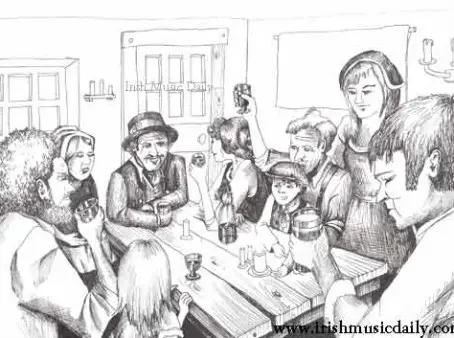Videos
Lyrics and Chords
History of the Parting Glass
The Parting Glass is a great example of that special quality found in the best farewell songs – being able to combine joy and sorrow in a way that is both sad yet uplifting at the same time.
It’s thought to have been a popular New Year’s Eve song in both Ireland and Scotland before it was superseded by Auld Lang Syne. The song may have fell out of use during New Year celebrations but it still remains popular in Ireland and throughout the world.
It’s a song of farewell, sung for and to close friends. It conjures up the same feeling as Shakespeare’s “parting is such sweet sorrow”.
This Irish classic may make you cry, but in a moving and life-affirming way.
So fill to me the parting glass
The singer must depart but where is he going? Does he simply have to leave the area or the town? Will he ever return? Or is he foreseeing that he does not have long to live and this really is the final farewell?
It’s never made clear so we can interpret it in our own way, depending on what suits our circumstances at any given time.
No regrets for a life well spent
The opening verse makes it clear that this is a person who is comfortable with himself.
He seems to have had a happy go lucky approach to life. He’s never had very much money but what he had he spent in good company.
It doesn’t sound like he’s the kind of person who ever did much wrong but, in any case, whatever harm he may have done, it was only to himself.
Good night and joy be with you all
As for mistakes, he may have made several but he can’t remember them. It’s like an Irish forerunner to Edith Piaf’s Je ne regret rien – No Regrets.
Any mistakes he may have made, through want of wit or whatever, no longer matter. He can’t even remember them. All that matters is the here and now, the impending departure and the need to be at peace with friends.
The parting glass comes with a toast: Good night and joy be with you all.
Sorry for my going away
This is a popular man who is welcome wherever he goes. All the friends he has ever had are sorry when he leaves them; his many sweethearts always wished he could stay at least another day.
But something is happening that is beyond his control. His comrades may stay but he must leave. He will do so with the kind of warmth and quiet dignity that we suspect has accompanied him all his life.
I gently rise and I softly call,
Goodnight and joy be with you all.
Performances of the Parting Glass
The Parting Glass is one of many Irish songs that were made popular again in the folk revival of the 1950s and 60s. It will always be associated in many people’s minds with The Clancy Brothers and Tommy Makem who sang it as the final song at many of their concerts.
The Dubliners also did notable versions and then bands like The Pogues brought the song to a new audience in the 1980s. More recent artists like Loreena McKennitt and Cara Dillon have reinterpreted it for a new generation.
Bob Dylan’s version of the Parting Glass
Bob Dylan never recorded the Parting Glass but, as he did with many traditional Irish songs.
He reworked both the words and the melody to create a song of his own.
Click to videos page for Bob Dylan’s reworking of The Parting Glass – as Restless Farewell.
History of the Parting Glass

The song has been sung in Ireland since at least the early 18th century.
It shares its melody with another old Irish song called Sweet Cootehill Town, which also tells of departure as the singer prepares to leave for America.
The first official reference to The Parting Glass is in a printed broadsheet from 1770 but it is certainly much older than that.
The Parting Glass may have a dual Irish and Scottish heritage as there is a version of it in a collection of Scottish songs published in the Skene Manuscript in the mid 17th century.
A version of the song was also popular in Scotland

The song was also popular in Scotland which provides us with the first known written reference to at least some of the lyrics.
They were quoted in a farewell letter by a man call Armstrong, who was a reiver – a kind of raider-outlaw along the English and Scottish border. He was executed in 1605 for the murder of a Scottish noble. A portion of the first stanza is very similar to lines in the opening stanza of the Parting Glass.
Armstrong’s Goodnight
This night is my departing night,
For here I must no longer stay;
There’s neither friend no foe of mine
That wishes me away.
What I have done through lack of wit,
I never, never can recall;
I hope you’re all my friends as yet;
Good night and joy be with you all.
Similarities to the Parting Glass
The similarity to the Parting Glass is quite striking, particularly the final four lines ending with the same refrain: Good night and joy be with you all.
This suggests that the song may have originated in Ireland or, perhaps more likely, travelled back and forth between the two countries. There was, of course, a lot of interchange between them at that time because of the Scottish settlers who were arriving in Ireland.
Global Reach and Popularity
In recent years, The Parting Glass has transcended its traditional roots, finding new audiences across the globe. It has been performed by renowned artists like The High Kings, Ed Sheeran, and Celtic Woman, broadening its appeal to international listeners. This revival highlights how timeless the themes of farewell and remembrance are, resonating with audiences who might be hearing the song for the first time.
Cultural Significance
While many associate the song with Irish gatherings and partings, its cultural influence stretches across Scotland as well. The song has often been used at the end of social occasions, particularly wakes, where it encapsulates the bittersweet emotions of goodbye. These shared traditions underscore the deep emotional connection that communities, both in Ireland and Scotland, maintain with the song.
The Parting Glass in Popular Culture
Over time, The Parting Glass has featured prominently in film, television, and modern performances, introducing its poignant lyrics to new generations. For instance, its inclusion in popular TV series such as Outlander and The Walking Dead has further cemented its place in global culture, helping to keep the song relevant in today’s media landscape.
